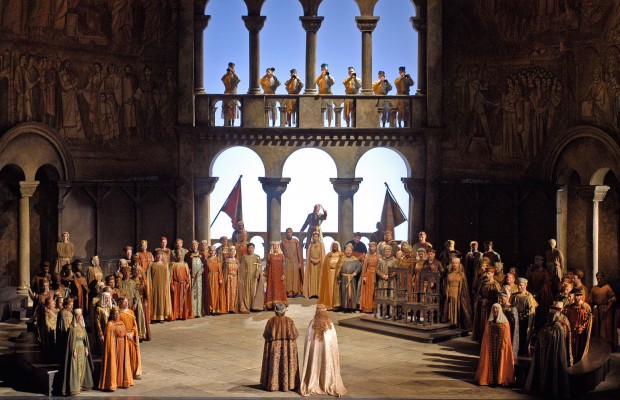This was a superb, thrilling performance, chiefly thanks to James Levine and his amazing orchestra – he got a tremendous reception before the opera started, an expression of the admiration and affection of the audience; but he and we in the cinema should be spared the sight of his conducting, now a matter of limited gestures and unlimited facial expressions. He timed the whole work more sensitively than I have ever heard it before, so that there were almost no longueurs, which is a remarkable feat.
Choosing the, or more accurately a Paris version, even Levine couldn’t prevent the opening scene between Venus and Tannhäuser being tedious. It’s so much the worst operatic music Wagner wrote that it’s almost interesting, but really it sounds just like an interminable row between two dull people who are getting on one another’s nerves but can’t let go.
By contrast, the Venusberg music in the Paris version is the most repulsive and astounding music Wagner wrote, and makes one wonder why Richard Strauss, Scriabin etc. bothered with their endless climaxes. Though it’s a commonplace to say that it couldn’t have been written without Tristan, it is wholly different in feeling. In Tristan Wagner is dealing with unappeasable longing, whereas the Venusberg music all too graphically portrays what D.H. Lawrence called frictional sex, and post-coital tristesse of monumental proportions. Played with this intensity, it almost induces a nervous breakdown in the sensitive listener.
The choreography, by Norbert Vesak, is impressive, only bettered in my experience by Maurice Béjart in Bayreuth in 1962. The settings are the traditional semi-naturalistic ones by Günther Schneider-Siemssen, the production by Otto Schenk. It all looks remarkably good, often beautiful, so is clearly taboo with today’s operatic trendies. I find the opera presented like this much more profitably interesting than, say, the latest Bayreuth production, where there is no music for the first ten minutes, where technicians go about turning human faeces into food, with elaborate machinery, and the opera ends with Venus giving birth to the (anti-)hero’s baby.
Tannhäuser’s title role is notoriously hard to cast, with its high tessitura, so more or less inevitably Johan Botha sings it, and I suppose we should be grateful. He has lost a little weight, but is still vast and mainly expressionless; and now his voice has hardened into something approaching a whine. Neither of the two leading women is altogether satisfactory either. Michelle DeYoung now has a wide beat in her voice, and is pretty unalluring from any point of view, though enthusiastic. Eva-Maria Westbroek is an excellent actress, but her voice too has hardened, so these three between them provide scant vocal pleasure.
Westbroek, however, is still moving, even if she doesn’t manage fully to convey Wagner’s remarkable stage direction in Act III: ‘Elisabeth expresses to [Wolfram] by gesture that she thanks him from her heart for his faithful love, but that her way leads to heaven, where she has a high purpose to fulfil; he must therefore let her depart alone, and not follow her’, but few singers can. She keeps the vindictive Christians at bay heroically in Act II, and has all the right intentions, but wilting resources.
The two outstanding singers are Peter Mattei as Wolfram, really marvellous in demeanour and in the use of his rich, luscious voice, and he gets a move on in his two big arias, without any impression of hurry. The same can be said for Günther Groissböck as Hermann; I look forward to seeing and hearing a lot more of him. This was one of those occasions when, thanks to intensive rehearsals and commanding conducting, the whole was much more than the sum of its parts. Tannhäuser remains the least satisfactory of Wagner’s operas, but in an account like this, one realises afresh that the flawed works of a great master are often more interesting than the polished products of a leading second-rater.







Comments